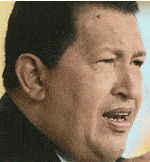LATIN AMERICA

|
|
|
Some are less enthusiastic. Peru remains undecided, with officials saying the solution lies in strengthening existing multilateral institutions. Brazilian foreign minister Celso Amorim says Brasilia will review the banks operational details before committing.
According to Ecuadorian president Rafael Correa, Banco del Sur should become a regional monetary fund and central bank. He says Latin American governments have some $200 billion in reserves deposited outside the region, which he views as a way in which poorer nations are financing developed ones.
Chvez argues the new Caracas-based bank will further reduce the IMF and World Banks influence in the region. In 2005 the IMF placed 80% of its loans in Latin America, a figure that has fallen to around 1% as Chvez has stepped in to extend credit to his neighbors.
Speaking at the IDB meeting, US Treasury secretary Henry Paulson said the IDB is the regions development bank, in an apparent jab at Banco del Sur. He also added a note of concession, however, commenting, If the question is, really, where the IDB should be headquartered [it is currently in Washington], then maybe thats something that should be open for discussion.
Banco del Surs first operation is expected to be the financing of the Argentine-Bolivian section of the Gasoducto del Sur regional gas pipeline. The $20 billion project will wend its way through South America, beginning in Venezuela. Washington will have a tough time competing to provide funding for such projects.
Antonio Guerrero



